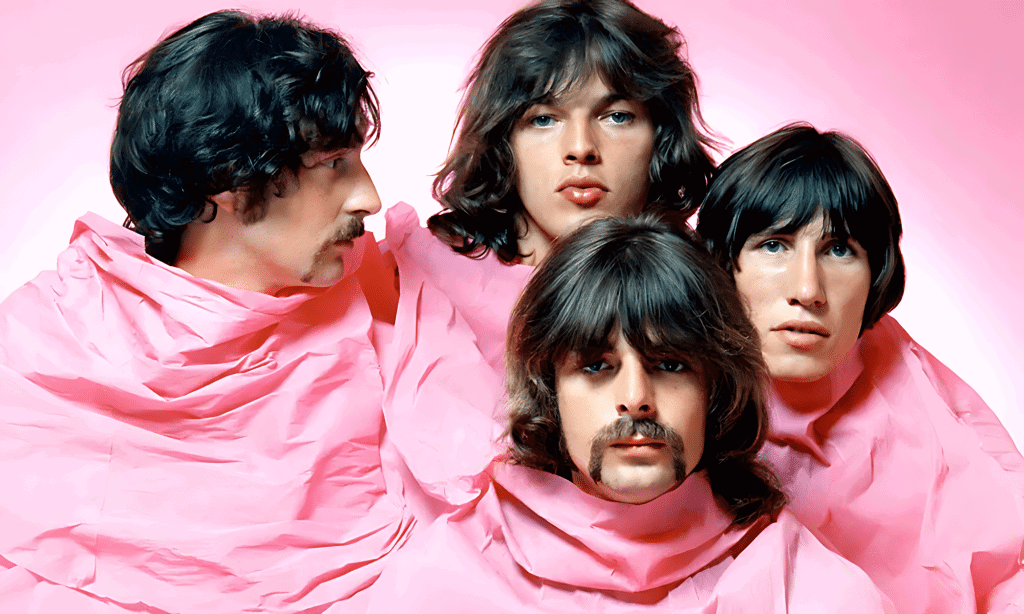Pink Floyd’s lead singers have left a lasting mark on rock music.
From Syd Barrett’s playful tones to Roger Waters’ raw emotion and David Gilmour’s smooth vocals, each brought a unique sound to the band.
But do you know who sang which iconic tracks? Pink Floyd’s vocalists’ stories are as rich and varied as their music.
It’s a tale of creativity, conflict, and change that shaped one of rock’s most innovative groups.
Understanding the roles of these singers gives us insight into the band’s evolution from psychedelic pioneers to stadium-filling legends.
Ready to explore the creative minds behind “The Dark Side of the Moon,”“The Wall,” and other iconic masterpieces?
Let’s explore the men who gave voice to Pink Floyd’s vision and how they helped create some of the most unforgettable music in rock history.
The Early Days: Syd Barrett

Pink Floyd’s story begins with Syd Barrett, the band’s original creative spark and lead singer.
His unique vision shaped the group’s early sound and set them on their path to stardom.
1. Formation and Rise
Syd Barrett brought a fresh approach to Pink Floyd’s music in the mid-1960s.
His imaginative songwriting and distinctive vocals were key to the band’s success.
Barrett’s style helped Pink Floyd stand out in the bustling London music scene.
2. Key Contributions
Barrett’s voice led to some of Pink Floyd’s earliest hits.
Songs like “Astronomy Domine” and “See Emily Play” showcased his unique style.
The band’s first album, “The Piper at the Gates of Dawn,” was largely Barrett’s creation, featuring his vocals on most tracks.
3. Decline and Departure
Sadly, Barrett’s time with Pink Floyd was brief.
His mental health began to suffer, affected by heavy drug use.
As his behavior became more unpredictable, the band faced tough choices.
Gradually, Roger Waters and new member David Gilmour took over lead vocal duties, marking the end of Barrett’s era with the group.
Despite his short tenure, Barrett’s influence on Pink Floyd’s music lasted long after his departure, shaping their sound for years.
The Transitional Phase: Roger Waters

After Syd Barrett’s departure, Roger Waters filled the void, gradually becoming Pink Floyd’s primary creative force.
1. Taking the Helm
Waters’ influence grew steadily in the early 1970s.
His songwriting began to steer the band towards more thought-provoking themes and complex album concepts.
This shift marked a new era for Pink Floyd, as they moved away from their psychedelic roots towards a more reflective and socially aware sound.
2. Iconic Albums and Songs
Waters’ voice became central to some of Pink Floyd’s most famous works.
On “The Dark Side of the Moon,” he took lead vocals on key tracks like “Brain Damage” and “Eclipse.”
His creative vision drove the concepts behind albums such as “Wish You Were Here,” “Animals,” and “The Wall,” each exploring deep, often personal themes.
3. Tensions and Departure
As Waters’ control over the band’s direction increased, so did tensions with other members.
His strong personality and desire for creative control often clashed with his bandmates’ ideas, particularly David Gilmour.
These conflicts eventually led to Waters’s departure from Pink Floyd in 1985, a move that significantly changed the group’s dynamics and sound.
Waters’s era as Pink Floyd’s key vocalist and songwriter produced some of the band’s most critically acclaimed and commercially successful work, cementing their place in rock history.
The Later Years: David Gilmour

David Gilmour’s role in Pink Floyd evolved significantly over time, eventually leading him to become the band’s primary vocalist.
1. Ascension to Lead Vocalist
After Roger Waters left the group, Gilmour stepped up to fill the vocal void.
His smooth, melodic singing style and skillful guitar work became a defining element of Pink Floyd’s later sound.
This transition marked a new chapter in the band’s history, with Gilmour’s voice guiding their musical direction.
2. Significant Contributions
Gilmour’s vocals were central to many of Pink Floyd’s most popular songs.
His voice brought life to tracks like “Comfortably Numb,”“Wish You Were Here,” and “Money.”
After Waters’ departure, Gilmour led on albums such as “A Momentary Lapse of Reason” and “The Division Bell,” showcasing his ability to carry the band’s legacy forward.
3. Legacy and Final Works
As the face and voice of Pink Floyd in their later years, Gilmour played a crucial role in maintaining the band’s place in rock history.
His contributions extended to their final studio album, “The Endless River,” which featured his vocals on the closing track, “Louder Than Words.”
This last offering was a fitting capstone to Gilmour’s tenure as Pink Floyd’s lead singer.
Gilmour’s era solidified Pink Floyd’s status as a rock legend, proving that the band could continue to create compelling music even after significant changes in lineup and direction.
The Collective Impact

The story of Pink Floyd’s lead singers is one of evolution and collective artistry, with each vocalist adding a unique layer to the band’s rich sound collection.
1. Collaborative Dynamics
Each of Pink Floyd’s lead singers brought something distinct to the table.
Syd Barrett’s imaginative lyrics and strange melodies laid the foundation for the band’s experimental nature.
Roger Waters built upon this with his sharp, introspective songwriting and conceptual albums.
David Gilmour’s smooth vocals and guitar virtuosity added a new dimension to the group’s sound.
Together, these voices created a musical journey that spanned decades and genres.
2. Enduring Legacy
The impact of Pink Floyd’s lead singers extends far beyond their time with the band.
Their collective work has left an unforgettable mark on rock music, influencing countless artists across generations.
From Barrett’s psychedelic innovations to Waters’ grand conceptual works and Gilmour’s soaring guitar-vocal interplay, each era of Pink Floyd vocals contributed to the band’s status as rock pioneers.
Pink Floyd’s lead singers didn’t just create music; they crafted sonic experiences that continue to resonate with listeners today.
Their ability to evolve while maintaining a distinct identity is a testament to the power of their combined talents.
Final Words
Pink Floyd’s lead singers each played a crucial role in shaping the band’s iconic sound.
Each vocalist brought something unique to the group, from Syd Barrett’s psychedelic beginnings to Roger Waters’ conceptual masterpieces and David Gilmour’s melodic finesse.
Their collective impact on rock music is undeniable, influencing generations of musicians and fans alike.
As we’ve seen, the story of Pink Floyd’s vocalists is one of evolution, creativity, and sometimes conflict.
It’s a testament to the band’s resilience and artistic vision that they were able to create groundbreaking music through these changes.
Whether you’re drawn to Barrett’s fancy, Waters’ intensity, or Gilmour’s smoothness, there’s no denying the power of Pink Floyd’s voices.
Their legacy continues to inspire, reminding us of the enduring impact of truly innovative music.





















